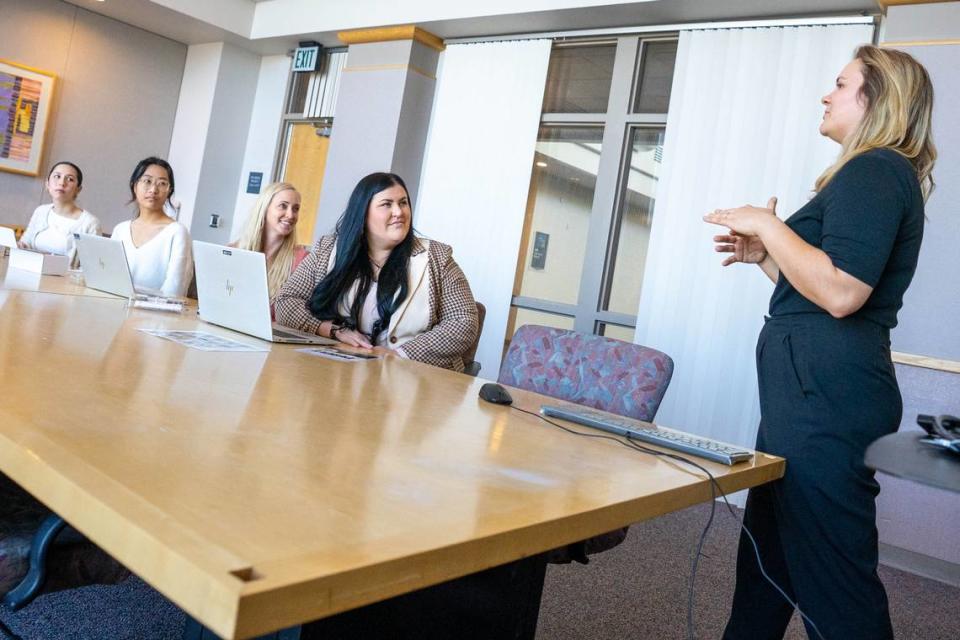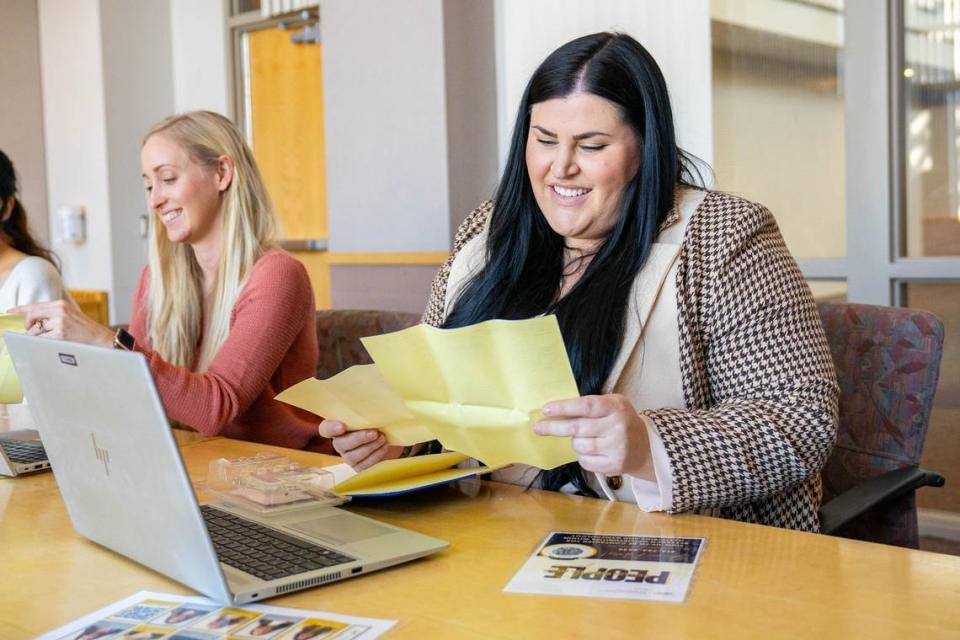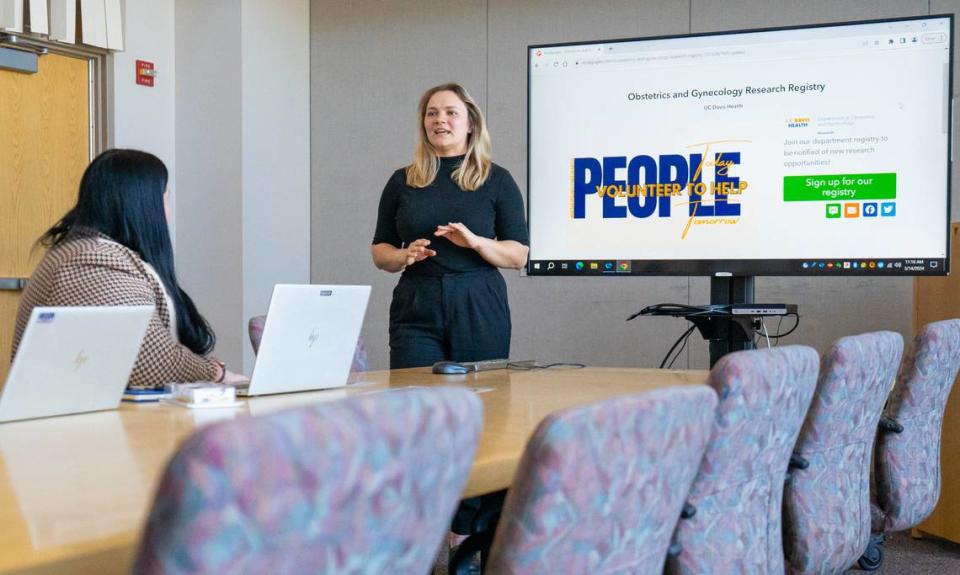How Sacramentans can get paid to train for a science career — and be job ready in months
A training program at UC Davis Health is giving Sacramento residents the chance to start a career in the sciences, even if they don’t have a bachelor’s degree.
Over 16 weeks, participants will gain the knowledge and skills they need to land jobs as clinical research coordinators paying hourly wages of $27 to $48. An added perk: Trainees will get a stipend, allowing them to reduce their work hours and focus on their studies.
Upon completing the classroom portion of the program, the trainees will work full-time as clinical research coordinators for about 4½ months and just might get a permanent position at UC Davis Health, said Kate Marusina, director of UCD’s clinical trials office.
Because there’s a shortage of qualified workers, she said, clinical research coordinators are in demand nationwide at not only universities but also with the Veterans Health Administration, the National Institutes of Health and at public and private research organizations.
“Clinical research is an integral part of the development of new medicines, therapeutics, medical devices,” Marusina said. “Without clinical research, there will be no innovation in medicine.”
The UCD training program started two years ago, but this will be the first time that enrollment will be limited to Sacramento adults. The city of Sacramento provided $250,000 grant to do so.
The program will start in a few weeks, and the Greater Sacramento Urban League is working with UCD Health to help identify potential candidates from lower-income neighborhoods that historically have not benefited from economic development.
If trainees complete the program and get hired, they would play a key role in keeping clinical research on track, Marusina said. To do so, she said, they must adeptly handle many tasks.
They ensure that study volunteers understand what will happen to them before they consent to participate in a study. They schedule participants for their visits. They collect data needed to evaluate the safety and effectiveness of the products being investigated. They communicate with regulatory entities such as institutional review boards and the U.S. Food and Drug Administration.

Career is in-demand but not commonly known
There’s more to this list, said Courtney Overstreet-Benoit, a clinical research manager at UC Davis Health. She got her first exposure to clinical trials 12 years ago as a research intern at UC Davis Health where scientists conduct more than 2,000 studies at any given time.
That internship introduced Overstreet-Benoit, now 35, to clinical research coordinators and what they do, she said, and after she finished her internship, UCD Health hired her as a clinical research coordinator. Now a manager, she said she loves many elements of her work in the area of obstetrics and gynecology.
“You have the opportunity to engage with people and get to know them in a health care setting, but also ... you’re able to spend more time with them, so connect on a personal level,” she said.
Overstreet-Benoit now supervises one of the graduates of UC Davis Health’s training program: Alina Patrikeyeva. The 26-year-old Patrikeyeva said the lectures, in-class activities, field trips and hands-on experiences gave her a comprehensive look at what clinical research coordinators, or CRCs, do.
“I got to shadow them in a bunch of different departments, actual CRCs doing their jobs,” said Patrikeyeva, who has a bachelor’s degree in nutrition. “Every day is different, and you really did get to see that with the shadowing experiences.”
Patrikeyeva said that, like Overstreet-Benoit, she stumbled upon this career field, meeting her first CRC when she volunteered to participate in a study. She found the UCD training program, known as Join the Team, as she was doing online searches for potential jobs.
If Patrikeyeva had to name one reason why she was selected for the training program, she would probably say that it was her curiosity about the position, her desire to learn new things and the work she did on her own to educate herself and ensure she was prepared.
It probably also helped, she said, that she had been a past participant in a study: “I had a little bit of an insight as to how it works and what it took to at least participate in a clinical trial, which being a participant could be a lot of work in its own way.”
If you have experience in customer service, as Overstreet-Benoit does, that’s definitely an attribute because people skills are integral to the work of a clinical research coordinator, she said. Once a worker at a gluten-free bakery, Overstreet-Benoit spent a lot of time explaining ingredients and answering customer questions, so she’s very comfortable with explaining protocols and addressing study participants’ queries.

UCD Health training program will begin in mid-April
Marusina said UC Davis is looking to fill five slots in the Join the Team program that will begin in mid-April. So far, she said, they have received 70 applications but have not yet made final decisions. The application period will close after UCD Health has filled all five spots. Applicants should be able to demonstrate:
▪ A strong desire and ability to work full-time in health care
▪ Experience in health care roles such as past work as a community health worker or home health aide
▪ Comfort with learning scientific concepts
▪ Strong customer service capability
▪ Comfort with technology such as computers, email and the internet
▪ Clear drug screening and background check
▪ COVID-19 vaccination
▪ The ability to attend scheduled classes and study independently online for 20 hours per week up to 16 weeks
▪ The capability to work full-time for about 4.5 months after completion of the didactic portion of the training program
If UCD finds excellent candidates who for some reason can’t be included in the upcoming class, Marusina said, they can apply for the fall 2024 program.
Since Join the Team began, four groups of students — 22 in all — have completed the program, and UC Davis hired 60% of those trainees. While previous classes included some UC Davis employees, the city grant prohibits including members of the UCD workforce.
Join the Team has been recognized and commended by national bodies, including the Association for Clinical Research Professionals and the Society for Clinical Research Sites. Just last year, UC Davis Health earned an award from the Society for Clinical Research Sites for its Join the Team program.
Managing the workload from training courses could be a tough balancing act for someone who is working full-time, Patrikeyeva said, but both she and Overstreet-Benoit said that people entering the profession will find it rewarding and challenging.
“I’ve made connections with participants and been part of their hopes and journeys,” Overstreet-Benoit said. “But then also, (I have been) able to contribute to health care and advancing the care that’s provided for all people, especially in our field of women’s health. It’s something I’m very passionate about.”
At the same time, she said, the range and number of responsibilities require people who are comfortable juggling tasks and being flexible or adaptable.
“Clinical research coordinators ... wear many hats,” Overstreet-Benoit said, and it’s potentially 17 positions in one.”


